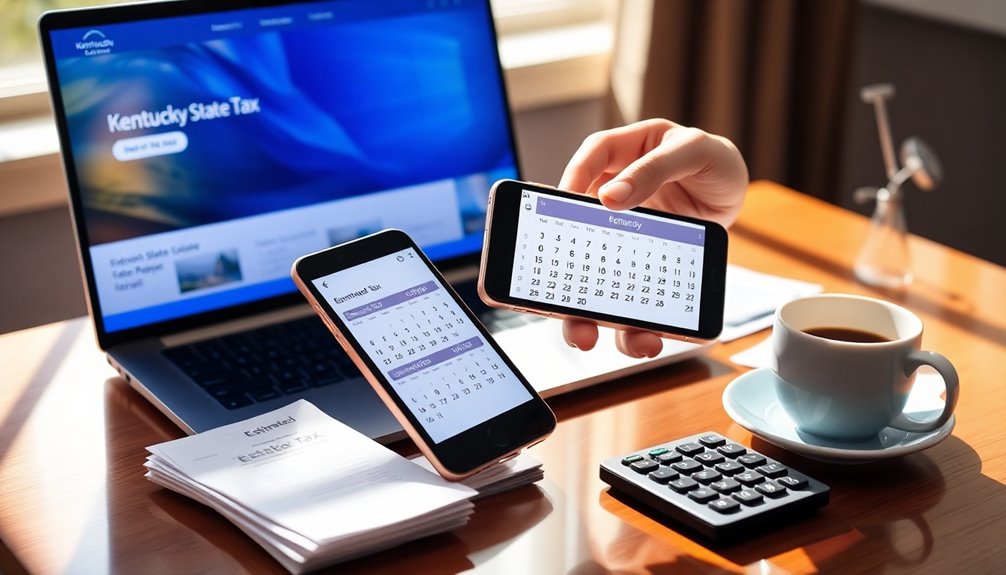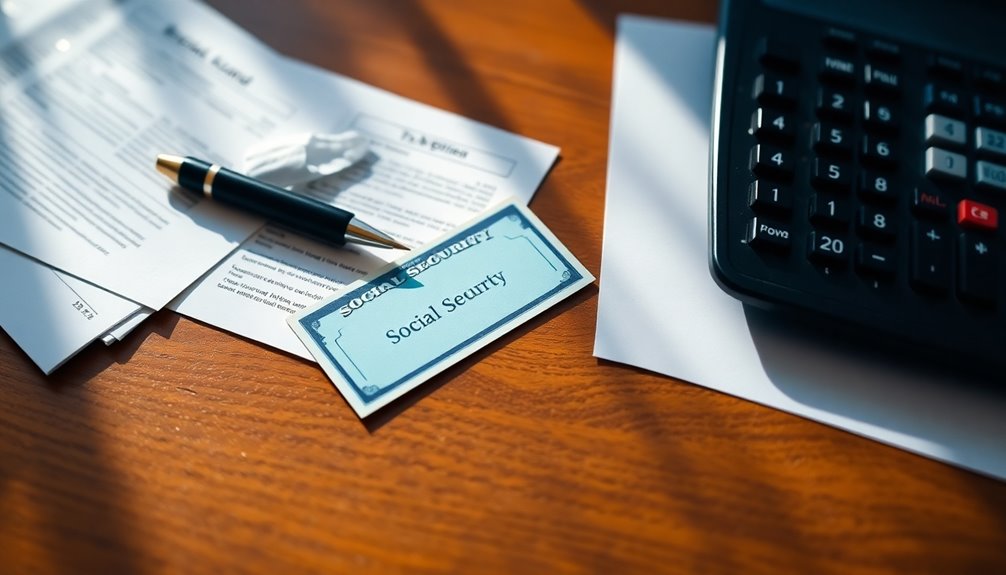You can pay your Kentucky state taxes in several ways. For online payments, visit the Kentucky Department of Revenue EEPS site and select the tax type, opting for free bank transfers or credit/debit cards with fees. If you prefer mailing, send checks or money orders with your completed Form 740-V to the Kentucky Department of Revenue in Frankfort. Don't forget to include your name, SSN, and tax period. You may also need to make estimated payments if you expect owing more than $500. To avoid penalties, make sure you meet the April deadlines. There's more to explore!
Key Takeaways
- Pay online via the Kentucky Department of Revenue EEPS website using a bank account for no fees or credit/debit cards with convenience fees.
- Mail payments to Kentucky Department of Revenue, Frankfort, KY 40619-0008, including your full name, SSN, and tax period on the check.
- Use Form 740-V for check or money order payments, payable to "Kentucky State Treasurer," and include your Voucher Form 740EXT for tax extensions.
- Estimated tax payments are required if you expect to owe over $500 or have income exceeding $5,000 without Kentucky tax withheld.
- File your tax return and make payments by April 15, 2024, to avoid late penalties and interest on unpaid balances.
Payment Options

When it comes to paying your Kentucky state taxes, you have several convenient options to choose from. One of the simplest methods is making a direct payment from your bank account through the Kentucky Department of Revenue's EEPS site. This option doesn't incur any additional fees, but you'll need to provide your demographic information and Tax Account Number, which is your Social Security Number for individual income tax. You can also print a payment confirmation for your records.
If you prefer using a credit or debit card, you can pay through the same EEPS site, though keep in mind that a convenience fee of 2.75% for credit cards and 1.5% for debit cards applies. This method is available for various tax types, including corporate taxes.
Alternatively, you can pay by check or money order using Form 740-V for individual income tax. Make sure your payment is made out to "Kentucky State Treasurer" and includes your name, address, SSN, and "2023 Form 740." Mail it to the specified address on the form. Additionally, individuals earning over $2,000 must file a tax return, ensuring they are compliant with Kentucky's tax filing requirements.
Other methods, like in-person payments and payment agreements, are also available for your convenience.
Online Payment Process

Paying your Kentucky state taxes online is a straightforward process that you can complete in just a few minutes. Start by accessing the Kentucky Department of Revenue EEPS website. You'll need to enter your demographic information, choosing "Tax Account Number" as the account type. Select "Individual Income Tax" or "Individual Income Tax – Estimated Payment" as the tax type, and enter your Social Security Number as your account number.
Once logged in, you can choose from several payment methods. You can make a direct online payment from your bank account for free using ACH/Electronic Check. If you prefer using a credit card, be aware there's a 2.75% convenience fee per transaction, while debit card payments incur a 1.5% fee. Additionally, be mindful that tax bills can be looked up via the Property Tax Lookup, which can help you verify your tax obligations before making a payment.
Alternatively, you can arrange ACH credit through your bank. After selecting your payment method, enter the payment amount and confirm the details. Don't forget to print the payment confirmation for your records.
With these simple steps, you can efficiently manage your tax payments online and even check the status of your refund through the same portal.
Mailing Payment Instructions

To ensure your Kentucky state tax payment is processed correctly, follow these mailing instructions closely.
If you owe taxes and are including payment, mail it to the Kentucky Department of Revenue, Frankfort, KY 40619-0008. If you're expecting a tax refund, use the address Kentucky Department of Revenue, Frankfort, KY 40618-0006.
For tax extensions that include payment, don't forget to include Voucher Form 740EXT.
When mailing payments, you can use checks or money orders, both payable to the Kentucky State Treasurer. Be sure to write your full name, Social Security number, and the tax period on your check or money order.
It's recommended to use Form 740-V when sending payments. Remember, credit or debit card payments aren't accepted by mail.
Make sure your payment includes all required information, including your Social Security number and tax period.
If you're in a designated disaster area, label the top margin of your forms with "Kentucky Tornado Relief" in red letters.
For specific disaster relief instructions or any other inquiries, contact the Kentucky Department of Revenue for assistance.
Estimated Tax Payments

Estimated tax payments are essential for individuals, estates, or trusts expecting to owe more than $500 in Kentucky income tax for the year. If your income exceeds $5,000 from sources without Kentucky tax withheld, you'll need to make these payments. This includes income from pass-through entities or disregarded single-member LLCs filing Schedule C, E, or F. Additionally, it's important to note that local income tax may apply in addition to state rates, which can affect your overall tax liability.
To make your estimated payments, you have several options. You can pay directly online via bank account through the Kentucky Department of Revenue's EEPS site. Alternatively, you can use a credit or debit card, though be aware of the convenience fees (2.75% for credit cards, 1.5% for debit cards). You can also opt for ACH debit through their secure website or send a check or money order using Form 740-ES.
When calculating your payments, base them on 90% of your current year's tax liability or 100% of your previous year's liability, with an adjustment for high-income taxpayers.
Remember to consider tax credits like the Family Size Tax Credit. Using the Estimated Tax Worksheet will help you determine your estimated adjusted gross income and net income accurately.
Deadlines and Penalties

Meeting deadlines for tax returns and payments in Kentucky is crucial to avoid penalties. For the 2023 tax year, individual, corporate, and pass-through entity income tax returns, along with payments, are due by April 15, 2024.
If you file for a federal extension, you have until October 15, 2024, to submit your state tax return, but keep in mind that payments are still due by April 16, 2024.
If you miss the filing deadline, a penalty of 2% of the total tax due applies for every 30 days your return is late, capping at 20%. The minimum late filing penalty is $10, increasing to $100 after a jeopardy assessment.
For late payments, you'll incur a 2% penalty every 30 days, also maxing out at 20%. Interest will accrue on any unpaid balances, so it's best to pay by the original deadline. Additionally, be aware that if you are a seller with a sales tax nexus, you must also comply with sales tax collection and remittance deadlines to avoid additional penalties.
Special circumstances, like disasters, may allow for extended deadlines, but penalties can still apply. Be aware of additional penalties for fraud or failure to follow instructions, which can significantly increase your tax liability.
Stay proactive to keep your taxes manageable!
Frequently Asked Questions
What Should I Do if I Miss the Payment Deadline?
If you miss the payment deadline, don't panic.
First, file your tax return as soon as possible to minimize penalties. Expect late filing penalties up to 25% of the tax due.
Pay any owed taxes immediately to reduce interest charges, which will continue to accrue.
Consider contacting the Kentucky Department of Revenue for guidance on your situation.
If you're affected by a disaster, check if you qualify for any relief options.
Can I Set up Automatic Payments for My Taxes?
Yes, you can set up automatic payments for your taxes.
By using the Tax Payment Solution (TPS), you can register for Electronic Fund Transfer (EFT) payments, making it easy to manage your tax obligations.
This method ensures your payments are made on time, helping you avoid late fees.
Just remember to check the specific requirements for the type of tax you're paying, as options may vary.
Automating your payments simplifies the process!
Are There Payment Plans Available for Tax Owed?
Yes, there are payment plans available for tax owed.
If you can't pay your full tax liability within 60 days, you can apply for a payment plan. You'll need to demonstrate your inability to pay in full and provide detailed financial information.
Once you submit your application online or via Form 12A200, the Division of Collections will communicate the approval status.
Making larger monthly payments is advisable to reduce penalties and interest.
What if I Made a Mistake on My Tax Payment?
If you've made a mistake on your tax payment, start by identifying the error. Review your return for inaccuracies and double-check your payment amounts.
If needed, file an amended return using the correct form, attaching any necessary schedules. Remember, processing may take four to six months, and you can't e-file amendments.
Contact the Department of Revenue for assistance, and keep records of all corrections to avoid further penalties or interest.
How Can I Check the Status of My Tax Payment?
To check the status of your tax payment, visit the Kentucky Department of Revenue's website.
Look for the "Where's My Refund?" page, where you can check your refund status online. Just enter your Social Security Number and the refund amount.
If you prefer, you can call (502) 564-4581 during business hours to speak with an examiner.
Remember to have your details handy for a smooth process.
Conclusion
In summary, paying your Kentucky state taxes doesn't have to be overwhelming. You can choose from convenient options like online payments or mailing in your check. Just be sure to keep track of deadlines and make estimated payments if needed to avoid penalties. Staying organized and proactive will make the process smoother and help you avoid any last-minute stress. Take charge of your tax payments, and you'll feel a sense of accomplishment when it's all done!









